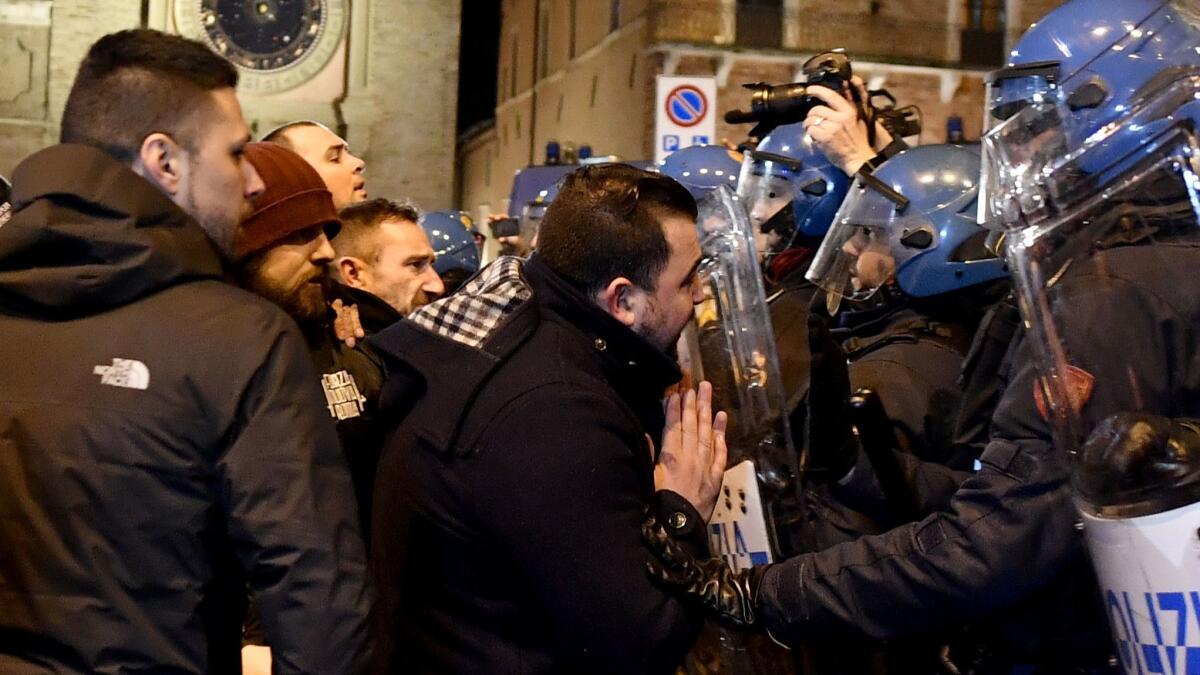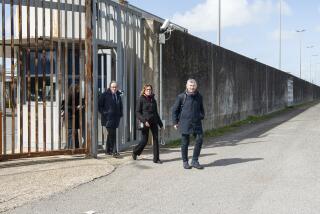Italy’s right wing takes aim at immigrants in election campaign

Bouncing her son on her knee in a bedroom in Milan,Tracy Obawmnoyi described her ambition to become a maid in Italy.
“People have been nice to me and I would love my son to go to school here,” said the 37-year-old Nigerian, who hopes to land a permit to stay in Italy, move out of a migrant center and get a place of her own.
But like thousands of other migrants largely from Africa, Obawmnoyi faces a huge challenge: She and other foreign newcomers have become the focus of Italy’s increasingly heated election campaign ahead of voting on March 4.
She is precisely the kind of person the country’s right-wing politicians want thrown out, and polls suggest they may have a chance to do it.
A three-way coalition — which appears close to gaining the 40% it needs to win the national election — features Matteo Salvini, head of the anti-migrant League; as well as a small party descended from Italy’s wartime fascist party; and Forza Italia, led by ex-Prime Minister Silvio Berlusconi, who is campaigning on a promise to eject 600,000 illegal migrants. Berlusconi is barred from office because of a fraud conviction.
The right-wing trio is benefiting from rising intolerance toward migrants after the arrival of more than 600,000 by sea, mainly Africans departing from Libya, over the last four years. Many have moved on and requested asylum in other European countries, but 200,000 are housed in reception centers in Italy waiting on asylum applications. Unable to work, migrants are seen loitering in small-town centers, provoking accusations from locals that they are happy to live off Italian taxpayers.
As the campaign rhetoric grew fiercer this month, a neo-Nazi set out in his car in the central Italian town of Macerata to avenge the gruesome slaying of an Italian woman, in which a Nigerian migrant is a suspect.
Luca Traini, who once ran unsuccessfully as a candidate with the League, is accused of shooting and wounding six African migrants with his legally registered Glock. After the drive-by shootings, the suspect climbed the steps of the town’s war memorial, gave a fascist salute and surrendered to police.
Instead of toning down his speeches, League leader Salvini doubled down, saying, “If anyone is to blame, it is the government which has allowed hundreds of thousands of illegal migrants to come here without any limits.”
In the northern region of Lombardy, which will elect a new governor during the national election, League candidate Attilio Fontana had already set the tone by claiming the “white race” was threatened by migration.
“It was a mistake,” he said of the remark on Feb 20. “I was very tired and this mistaken phrase came out. I have apologized, it meant nothing. I wanted to talk about our history, our tradition, our culture.”
But he said that if he became governor of Lombardy he would pressure the government to halt the transfer to the region of migrants rescued at sea and brought to Italy.
He cited a report from Italy’s secret services that terrorists may be entering the country on migrant boats.
“We cannot joke about this,” he said. “The whole idea of expulsions is about avoiding the possibility there may be terrorists among these clandestine migrants.”
In Milan, the capital of Lombardy, where a series of left-wing mayors has willingly taken in migrants, one local official took issue with Fontana.
“Politicians are appealing to fear and increasing the panic,” said Pierfrancesco Majorino, a city official who handles migrant arrivals. “This city shows how you can take in migrants and not lose votes, since the left was reelected in 2016.”
Milan was a staging post for migrants pushing north to countries such as Germany until France and Austria tightened checks on their borders with Italy. Now almost all stay put, although the number of new arrivals dropped by 75% between 2016 and last year, reflecting the drop in sailings from Libya after Italy reportedly cut deals with traffickers.
The city now hosts about 5,700 migrants, down from 6,000 in October. A late entry to the national political race, Emma Bonino, has pointed out that intolerance of migrants in Italy is greater where there are fewer migrants.
“Italy is not racist, but we do need to govern fear,” said Bonino, a human rights campaigner and former European Union commissioner.
The vitriolic campaign has encouraged a number of small pro-fascism parties in Italy to seek the limelight, with one group clashing with police in Macerata after the shooting there. In Rome, youths unfurled a banner paying homage to the anti-migrant shooter. Incidents of everyday racism go almost unreported. In Rome, a gang of far-right activists prevented a migrant couple from moving into their government allocated housing, to the cheers of Italian neighbors.
In Sicily this month, 21 young migrants ran for cover as shots were fired from a passing car at their reception center.
At Tracy Obawmnoyi’s center on the outskirts of Milan — a former residence for students — staff members said they were carefully trying to establish a rapport between locals and the 95 migrants being hosted.
“Seventeen children here go to local schools, which has really helped integration as they get invited to parties,” said Lucianna Balzano, the center’s manager. Male migrants are expected to do volunteer work, cleaning up graffiti and repainting fences.
“We sometimes get calls from staff at the supermarket, and have to go over to explain to new arrivals how customers put on plastic gloves when choosing fruit and vegetables,” she added.
The migrants also need to get used to the fact they will not be given a house and job on the spot. “That is what the people traffickers promise them,” said Balzano.
In the neat square by the center, resident Giovanna Mule, 60, said it was right to welcome the migrants.
“We Italians migrated to America — we lived through the same thing,” she said.
But across the square, sitting on a bench in the wintry sunlight, Paolo Meschia, 66, was unenthusiastic.
“My daughter has a master’s degree, is 36, can only find part-time work, and lives at home. We would be better off helping these migrants stay in their own countries rather than come here where there is no work,” he said.
Kington is a special correspondent.
More to Read
Start your day right
Sign up for Essential California for news, features and recommendations from the L.A. Times and beyond in your inbox six days a week.
You may occasionally receive promotional content from the Los Angeles Times.






